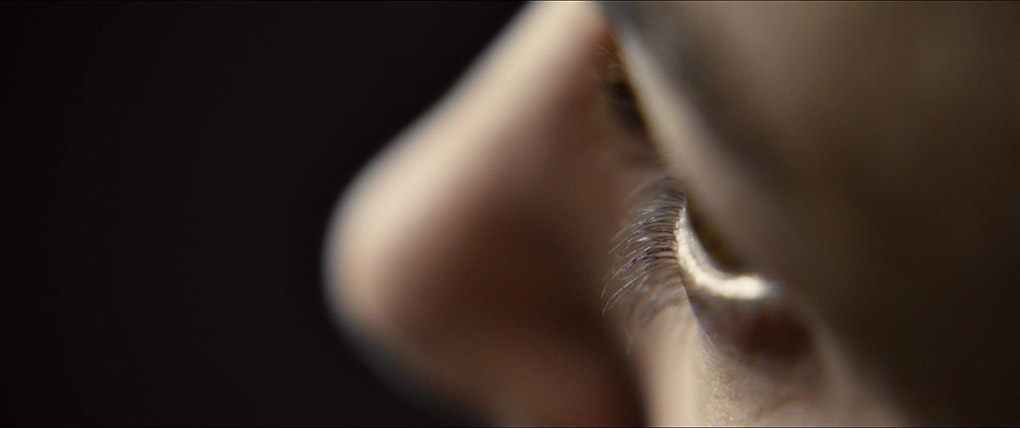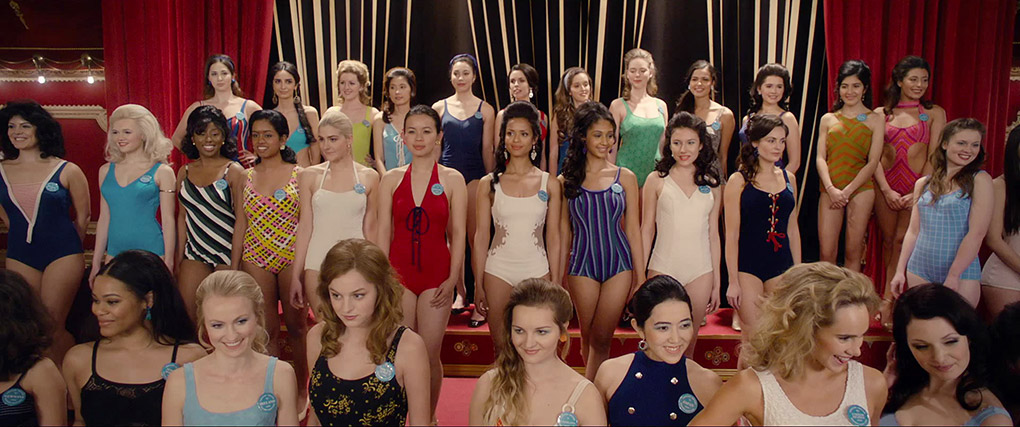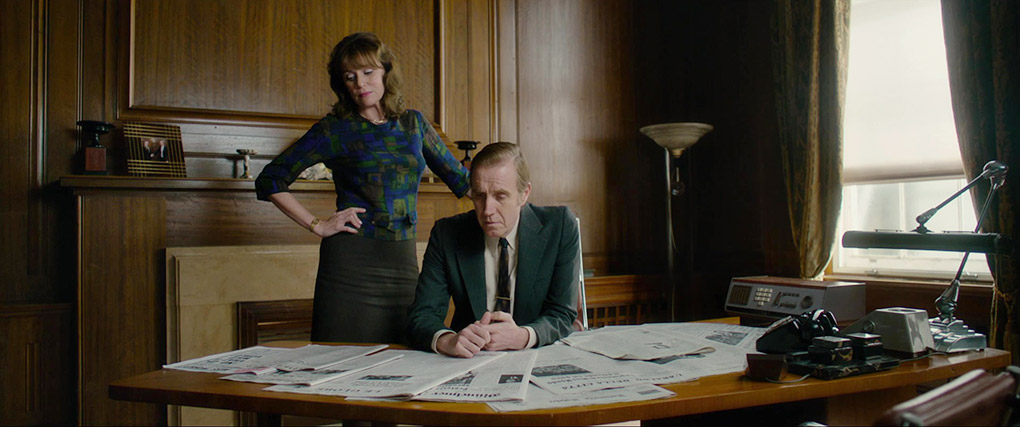| |
“Films in this vein have already made the case that homophobia ended when miners marched with gay rights activists (Pride) and that the gender pay gap was closed forever at an Essex motor plant (Made in Dagenham). Play Aretha Franklin loudly enough and you can drown out any amount of nuance.” |
| |
Ryan Gilbey, The New Statesman* |
Note: For the review, skip to paragraph two. To put the film’s importance in context, please indulge a political tirade of sorts in paragraph one. Thank you.
Sexism and racism have seeped back into our public debate like recurring tumours and nuance in communication seems not only almost a lost art and a threatened one but one that is impossible to practice via social media. A sound bite is not a sound argument. Just because you are offended by something doesn’t make it wrong or inappropriate. Chances are it’s a truth that’s necessary. Complex issues demand smart people devoting time to ironing out the path to all party’s satisfaction or mutual disgruntlement. Mutual disgruntlement is actually a fantastic outcome in any negotiation. If one of two parties feels like they’ve ‘won’, the other party has lost. Zero sum is not how deals should work. We are a social species using anti-social media. The great experiment of global-connectedness has revealed our base selves, anonymous at our keyboards responding to hateful content provided to stoke the flames of outrage and fear. Facts are discarded and batted aside like airborne irritants. Offence has become a synonym for argument (which it is plainly not) and now in the UK we teeter on a very real likelihood of a second wave of the corona infections because of rank stupidity on behalf of the government and a fair slice of the population. The United States has weakened itself as a world player with the copper clown running an inept and dangerous show inviting these tumours back into our societies (or simply prising off the lid to uncover what was always there, perhaps) not to mention the disastrous and late response to a very real threat to its population. I’m reminded of that relevant quote from Irish philosopher Edmund Burke: “The only thing necessary for the triumph of evil is for good people to do nothing.” Yes, he said ‘men to do nothing’ but hey, we are all in this together. People who care about society and liberal democracy better start proving it a little more than providing two strokes of a stubby pencil every four or five years (although that is the sure way to get rid of Trump this November). I simply cannot believe it has been four whole years.

Misbehaviour is easy to summarise; smart, idealistic firebrand Sally teams up with a rag-tag group of street activists to stage an intervention at the Miss World pageant for maximum media exposure of their Women’s Liberation message. Along the way relationships are forged and tested (advocating change has that effect) and there’s no surprise to say that as an historical event, its narrative’s outcome is well known. An ageist comment… well known to my generation. But that didn’t make a jot of difference. The enjoyment is in the performances, the magic moments, the clever but unshowy direction. Look at the very first shots of a woman nervous before an interview in front of five opinionated men. How do you treat that cinematically? We see huge close ups with very little depth of field from very unusual angles but the shots never strike you as unusual but compared to the rest of the film, they are majestically jarring but the fact these shots don’t jar mean that the director Philippa Lowthorpe and editor, Úna Ní Dhonghaíle, are firing on all cylinders. The editor’s invisible technique is not easy to pull off and often the humour and selected moments of high drama are editorially enhanced. I loved how little we stayed on the bomb blast. Wham, done. Its repercussions are far more interesting than lingering on a pyrotechnic special effect.
In 1970 the Women’s Liberation movement started to pick up traction. That was fifty years ago and today most women are still treated as second-class citizens all over the world. Of course women campaigned to get the vote via the Suffragette Movement started in 1903. Famously, imprisoned women were force fed if they went on hunger strike and one died from injuries sustained throwing herself in front of the King’s horse in the Epsom Derby, which made news all over the world. These were committed and brave women whose cause was won 15 years after their efforts began to a degree. Total equality is still an elusive goal. Misbehaviour (a wonderful title that took me a while to get – Miss Behaviour, Miss World?) is a reminder of how bad half the world’s human beings had it before one of them said “Hang on…” and went out and did something about it. Yes, things are considerably better today but sexism still exists but in 1970, sexism was the world’s standard operating procedure. Women cooked, cleaned, raised the children and sexually serviced the men. They also, at the birth of filmmaking, did most of the film editing, a craft seen akin to knitting in early Hollywood. Writing that today seems almost actionable but you can’t snuff out facts. Well, some try. The gold standard of female physical perfection was judged by what were known as ‘vital statistics’, the inch measurement of bust, waist and hips. It’s referred to early on in Misbehaviour and a scene later ends with the contestants measured and prodded to fill in all that ‘vital’ information. Being reminded of this aspect of male dominance, I applauded in my mind the sheer guts of actress Keira Knightley who did a topless shoot for a magazine ensuring the publishers to agree not to retouch or enlarge her breasts. Women should not need to conform to men’s idea of beauty or physical perfection. It should surprise no one that Knightley is the star of this particular examination of the overwhelmingly sexist side of our past.

The quote at the start of this review from The New Statesman’s Ryan Gilbey is right or rather Gilbey’s opinion chimes melodically with my own that crowd-pleasing safety is at the core of the genre of “Weren’t we just awful in the past!” But there is still a large role for cinema to perform in presenting different points of view even though some of us are old enough to remember the events in question. Yes, this ‘safe’ genre encompassing such luminaries as Mad Men on the box and the afore-mentioned Made in Dagenham – treads an extremely well worn path with very little to nudge it (emotionally speaking) off course. We know what’s going to happen but we also must remember that even the safest and most predictable narrative can have exceptional quality and Philippa Lowthorpe and her cast and crew have fashioned a hugely entertaining work that should be required viewing to better understand what strides women have made and the strides that still have to be taken to equalise today’s casual and accepted injustice. 1970’s sexism is alive and well in 2020 but it’s more artfully shrouded.
“Liberation is getting other people to do your work for you,” says Sally’s mother, which took me straight back to writer Caitlin Flanagan’s incendiary 2004 article written for the Atlantic magazine, “How Serfdom Saved The Women’s Movement.” It’s well worth a read.** The script is littered with moments that seem today from a different planet; Sally is physically judged as she enters the room for her interview… 7/10… This is quickly scribbled out and replaced with 9/10. I found both moments deeply questionable, to a degree. I had to remind myself that men and women are always sizing each other up as possible partners. That’s how our species propagates and it’s completely normal behaviour. But these thoughts belong in our heads not scribbled on a piece of paper and careening through our societies unchecked. Sally’s university tutor, when told that her dissertation was going to be on women in work, replied with a condescending attitude worthy of God’s towards uh… most everyone else. He attached half the world’s population to the phrase ‘minority interest’.
But I felt that the film’s appeal and entertainment potential lies almost solely in the laps of the cast and the exquisite performances. Keira Knightley as Sally Alexander puts what I imagine to be a personally invested stake into her role and even though a straight haircut attempts to make her cut-glass beauty dowdy… Do you understand how pernicious this is, the male gaze, the male power, the male judgement? Guilty as charged. In terms of this review, we have to recognise that film stars are people we want to watch. It’s a slippery slope. Permit me to slip now and again. Gugu Mbatha-Raw as Jennifer Hosten, (or Miss Grenada) maintains some dignity in an otherwise supporting role in the cattle call of contestants. I have to say that the smiles to camera and the cuts to the real women at the end of the film were hugely satisfying. Jessie Buckley as Jo Robinson was coming off a series of roles that placed her as the next… uh… Keira Knightley. She’d hit it big as Wild Rose and the concerned wife in Chernobyl, both performances worth celebrating. Her Jo here is the catalyst and every social movement needs a catalyst. Greg Kinnear as Bob Hope has a hard part to pull off. A sexist dinosaur and a sexual predator with a line of then, acceptable jokes, Hope is the beloved comedian but with a non-PC slant. Kinnear makes us feel his pain while wanting to slap the bastard into the middle of next week. With an even tougher role to fulfil is Mrs. Durrell herself, Keeley Hawes. The wife of the organiser of the Miss World competition has to be supportive of her husband, accepting the changes that made the competition more difficult to stage post Women’s Lib and yet still remain sympathetic. Hawes is a fascinating and quite superb actress who manages to tick every contradictory box. Mr. ‘Miss World’ Eric Morley himself is played by Rhys Ifans. How Ifans manages to make this sexist monster (by our standards) into a fully rounded human being brings me to accept that great, nuanced acting is its own reward. I should have hated him. I did not. Finally there is Ruby Bentall as Sarah. Ruby has distinctive looks that typecast her, more’s the pity. She’s the oddball, the italic in a sentence of conformity and I love her for it. From Lark Rise To Candleford to Verity in the new Poldark, she made her mark in Misbehaviour with some aplomb.

Finally there was a small detail that eluded me the first time around and it’s a cracker. I’m lucky enough to be a member of the same organisation as the editor of Misbehaviour so I could check a detail with a swift email. Sally is not impressed with her daughter ‘performing’ as if in Miss World in the living room while her partner busies himself in the kitchen. Her mother, cemented hard into her own era of never-mentioned subjugation, suggests that making Gareth cook is emasculating. To underline this idea, what’s the one vegetable he’s going at with a knife in the background? A carrot. Phallic symbolism has never been presented more gracefully. Editor Úna tells me that it was the actor’s choice after a cluster of vegetables was laid out for this scene. Bravo John Heffernan.
One last detail; the film was released in the UK just two weeks before lockdown disabling the film’s attempt to find a wider audience and scuppering a world-wide release. I’m happy to report that despite its availability via streaming services in the UK, it is getting a wider cinema release in selected countries. This modest film deserves a larger audience. Its message today cannot be understated. And as a conclusion, the film states that… “Attempts to bring down the patriarchy remain ongoing…” Long shall that effort last.
|